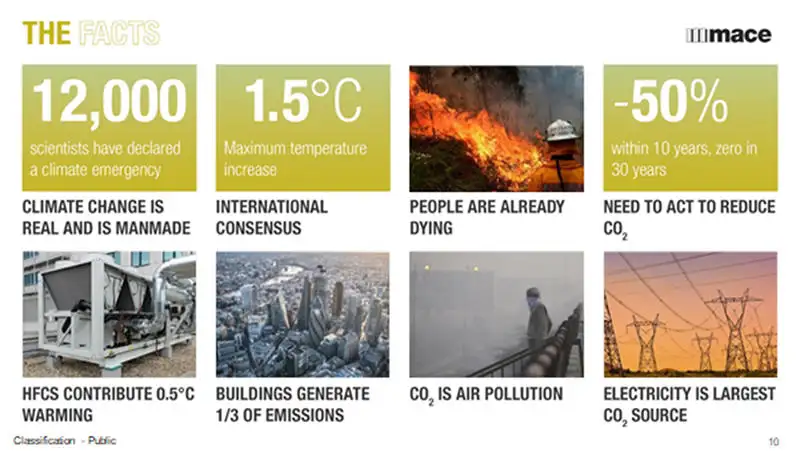Climate change and sustainability: school buildings
Introduction
Around 40% of man-made global carbon emissions come from the construction and operation of buildings.
)
School buildings (some of which have poor energy ratings) contribute a considerable amount to the greenhouse gas emissions across the county. Investing in school buildings will play a critical part on our journey towards net zero. This is huge undertaking, and we are still in the process of developing a specific road map for delivery across the whole school estate. The following outlines what we have done so far and some next steps. It also gives some pointers for what schools could think about doing individually to improve energy efficiency and some links to useful resources.
What is HCC doing?
Developing a strategic approach to deliver a carbon neutral primary school estate by 2030
The Net Zero Carbon Project is looking across the maintained school estate, analysing energy consumption and other data. 10 sample schools have been identified to trial a range of net zero carbon improvement measures. The learning from this work will help HCC establish a rollout programme of works across the sector. HCC will need look at how to use existing funding sources, such as Repairs and Maintenance, and also bid for external grants to support this objective.
If you want to know more about this contact DCDrequests@hertfordshire.gov.uk
Planning for new schools
A new build pilot school is underway in Buntingford. This school, due for completion in September 2023, will trial full Net Zero Carbon measures and provide detailed knowledge of how to build NZC schools moving forwards. The design encompasses sustainable measures throughout such as a piled concrete foundation in recycled steel tubes, a cross laminated timber frame, PV’s, air source heat pump, localised hot water provision and an attenuation pond to support habitat and biodiversity.
Public Sector Decarbonisation Fund
HCC secured over £24m of government public sector decarbonisation funding (PSDS), the third highest value awarded to a single public body organisation in England. This enabled over 200 decarbonisation projects across the County, around a third of which were in schools. Projects include electrification of heating systems, double glazing installations, cavity wall insulation and solar photovoltaic (PV) installations.
Public Sector Decarbonisation Scheme Phase 3b
Salix Finance announced Phase 3b of the Public Sector Decarbonisation Scheme, in partnership with the Department for Business, Energy, and Industrial Strategy (BEIS).
Phase 3 of the Public Sector Decarbonisation scheme, announced in September 2021 has already awarded £555.7 million to public sector bodies to upgrade public buildings with low carbon heating and energy efficiency measures.
Salix are currently assessing applications for Phase and may contact applicants as part of their process where further information is required. For further detail on the assessment process, please go to the applicant journey page on their website:
Salix Finance: Your Public Sector Decarbonisation Scheme Phase 3b application
Energy guidance
At a time when we are all concerned about our rising energy costs, we would draw your attention to the recently published energy efficiency guidance:
Gov.UK: Energy efficiency: guidance for the school and further education college estate
What can schools do?
You could start to think about:
- Assembling fuel consumption data on your building to start to understand your current carbon footprint (If you buy into the HCC energy contract this data is available to your school on Systems link where you can see usage and cost data, more information on this can be found on the Energy Team pages).
- Producing a sustainability and decarbonisation plan.
- Get ready to bid for future funding opportunities – HCC will alert schools when these come up by email
- Consider signing up to create an agreement with an energy provider to sell excess energy back to the national grid. More information from the Energy Management team.
3 actions you can take now:
- Install M2G controls
- Buy green energy
- Adjust boiler/temperature set points
M2G is an advanced intelligent boiler control that optimises the heating efficiency of hot water boilers. A unit attached to each boiler monitors the temperature of the water in the flow and return every 10 seconds and the information is recorded, along with the heat transfer rates at both the first and second stage firings.
Purchase green energy (if you are currently on the HCC contract your electricity is REGO backed green energy) and appoint a school “energy monitor” to look at energy usage every month and how much it is costing you, then set a target to reduce to spend money elsewhere i.e. more curriculum resources.
More information on how to monitor your energy meter usage, examples of good practice, how to apply for a Smart Meter to assist you with this and other resource in this area can be found on the Energy Team pages.
Be energy efficient by turning down the thermostat by 1degree, turn off lights when you leave a room/end of day, ensure every computer is off and not on stand-by, Also, consider are you paying for the energy you use and submit readings for accurate bills (do not allow “estimate readings”). Consider if you have significant out of hours/community use and if you can install sub-meters to monitor use of external lighting, community use areas such as halls out of hours.
Small
| Primary school solutions | Cost without discount | Energy saving |
| M2G intelligent boiler load controls | < £10k | 8% of gas/5.5% total energy |
| Endotherm energy saving additive which can be added to any wet based heating system | 7% of gas/5% total energy | |
| Set point adjustments/Good estates guide programme | 10% gas/ 7% total energy |
What other measures can you take to reduce your carbon emissions:
- Review age of IT (Information Technology) equipment and whether cloud servers could be used to reduce on site energy consumption.
- Generate localised hot water – install point of use hot water boilers.
Useful resources
- Salix: Public Sector Decarbonisation Scheme
- SCF Consult - How to procure consultancy services quickly and effectively
- The Carbon Trust
- Energy Saving Trust
- PassivHaus
- Office for Low Emission: Workplace charging schemes
UKSSN Operations Group for school operations
In addition, there is a growing UKSSN Operations Group for school operations staff from any school type, including Chief Operating Officers, Chief Finance Officers, estates managers and bursars. The group meets online 4-5pm once a month and have a UKSSN-hosted Microsoft Teams site for discussion and resource sharing. To join the UKSSN Ops Group mailing list email opsgroup@ukssn.org.uk
You can also follow the UKSSN Ops Group on Twitter (@UKSSN_OpsGroup) and ask to join their LinkedIn group.
The Schools Commercial Team (SCT) within DfE reviews a range of frameworks
The Schools Commercial Team (SCT) within DfE reviews a range of frameworks. These frameworks are assessed for compliance with procurement regulations, ease of use, suitability, and value for money. Feedback from schools is also considered when selecting frameworks. Further details can be found using the following link:
How much energy could we save the planet?
Share your successes, or ask us for resources
We are keen to hear from schools on the actions they are taking to reduce climate change. Contact us at climateactionschools@hertfordshire.gov.uk to share your success stories. The most inspiring will feature in our planned digital publication “Inspiring Stories to Reduce Climate Change in Schools”.
If you require further resources or support get in touch at: climateactionschools@hertfordshire.gov.uk. We of course can’t promise to always provide but are keen to support schools wherever possible.
